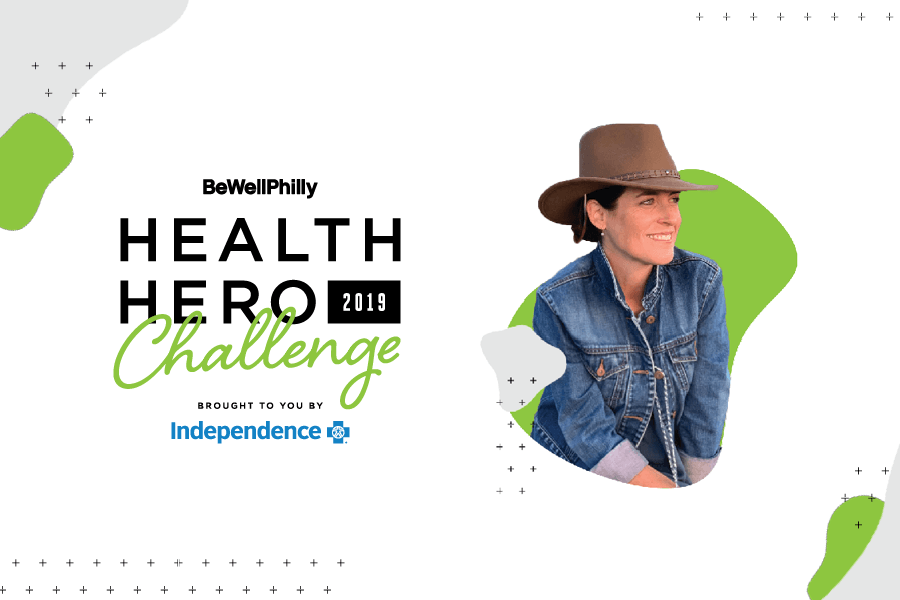This Main Line Equine Specialist Uses Horses to Heal Folks From Trauma and Mental Health Issues
Meet Kristen de Marco, the executive director of Gateway HorseWorks and a Health Hero Challenge semifinalist.

Kristen de Marco runs Gateway HorseWorks, a Main Line nonprofit that uses horses to help folks deal with mental health issues. / Graphic by Meredith Getzfread
Over the next few weeks, we’ll be chatting with our semifinalists in the 2019 Be Well Philly Health Hero Challenge to give you a glimpse of the people who are helping Philadelphians live healthier lives. Vote once a day, every day, to help decide which of these 10 semifinalists become one of three finalists — and get a sizable donation to a charity of their choice — here.
Name: Kristen de Marco
Role: Executive director of Gateway HorseWorks, a nonprofit that uses the healing power of horses in mental health, trauma, and addiction treatment.
***
Describe a health- or fitness-related turning point in your life.
Shortly after the birth of my son, I was faced with a divorce. I really grappled with how to move forward in my life with meaning and purpose. It was at the same time I heard about how horses were helping people with mental health issues. Growing up riding and training horses, I knew firsthand how horses had always helped me manage my own anxiety and depression.
I first experienced Eagala [a company that offers therapy involving horses] as a client, finding it profound and transformative. In 2011, I became certified as an equine specialist and started a for-profit company in 2012. It quickly became apparent that there was a demand for experiential, trauma-informed treatment modalities in our community. However, these innovative services were not being covered by insurance companies and thus were reserved for people who could afford to pay out of pocket.
When I was contacted by a Chester County probation officer requesting equine-assisted psychotherapy services for women experiencing incarceration, it became clear I needed to form a nonprofit so everyone in our community could access the healing power of horses. In 2015, that idea became a reality with Gateway HorseWorks. Founding and developing a nonprofit has changed the trajectory of my life. Working with people and horses continues to reaffirm for me the resiliency of the human spirit in the face of incredible adversity.

de Marco worked with Eagala to get a certification of equine-assisted psychotherapy. / Photograph courtesy of Kristen de Marco
Why is your selected charity meaningful to you?
Gateway HorseWorks delivers a revolutionary approach to mental health, trauma, and addiction treatment to champion recovery and transform lives through the healing power of horses. Every day, we serve survivors of trauma, justice-involved youth and adults, and veterans with post-traumatic stress, as well as those facing addiction or experiencing anxiety, depression, and grief. The interaction between the horses, treatment team, and clients provides the connection, safety, and trust needed to achieve emotional breakthrough. Stepping into the pasture, participants take the lead, engaging horses in experiential, non-riding activities. Without judgment, the horses mirror participant behavior, enabling them to self-reflect and jumpstart the healing process. Our licensed therapists and equine specialists assist clients in translating insights from the pasture, so they can be incorporated into daily life. Additionally, we aspire to overcome barriers of mental health oppression, poverty, class, and race to make equine-assisted psychotherapy accessible to all people in the Philadelphia region and to rebuild human connections and pathways to sustainable recovery.
What motivates you to try and make Philadelphia a healthier place?
I have called Philly my home for the last 23 years. In that time, I have witnessed the commitment from people and organizations alike to support one another. It has awakened a deep desire in me to be a part of this community and support and contribute something meaningful to people’s lives. Witnessing people experiencing their worthiness through the eyes of horses and helping to support the development of that connection beyond the barn propels me in my work in our community.
What “policy” would you institute to make greater Philadelphia a healthier region?
As the research surrounding trauma for people experiencing incarceration continues to grow, it has become apparent that we need to shift our mindset about mental health care in the prison system. While many who work in the prisons recognize the need to address mental health care in a meaningful way, there is a lack of funding supporting mental health care and reentry in the prison systems. For example, Pennsylvania has one of the longest wait times in the nation for someone requiring a forensic bed in a psychiatric hospital. The state needs to pass legislation and invest significant funding, so people can receive the mental health care they so desperately need as soon as possible during their term of incarceration.
What’s the most important part of your health or wellness regimen?
The most important part of my wellness regimen is making sure I take care of my own mental health. As the saying goes, you can’t pour from an empty cup. In addition to attending therapy myself, I spend time with horses outside of work. Making it a priority to enjoy horses apart from sessions with clients helps me get centered and remain passionate about my work and helps me stay clear so I can be as effective as possible during sessions.
What is your number one piece of health-related advice/encouragement?
Everyone will struggle with mental health at some point in their lives whether it’s due to addiction, the death of a loved one, or a life-threatening illness. One of the most effective messages of encouragement we provide to our clients is this: Despite how isolated and alone you may feel, there are people who truly care and want to walk alongside you during your darkest hour. The antidote to hopelessness is connection, so make sure to reach out and ask for help. It is a sign of strength and courage.


